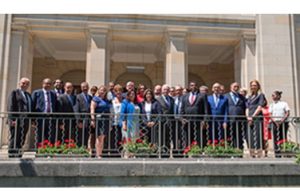.. DEMOCRATIC PARTICIPATION ..
Two articles from the The Inter-Parliamentary Union
Members of Parliament from the Middle East, including Israel and Palestine, have declared that access to clean water should not be politicized and should not be used as a weapon in regional conflicts. In a second roundtable, organized by the Inter-Parliamentary Union’s (IPU) Committee on Middle East Questions, MPs from Egypt, Israel, Jordan, Morocco, Palestine and the United Arab Emirates have also agreed concrete measures to tackle the water crisis that threatens to further aggravate regional instability.

Members of the IPU Committee on Middle East Questions gathered in Geneva on 6-7 July to find innovative solutions to regional water issues. ©IPU/Jorky
The areas earmarked for action include: mapping those communities most threatened by water scarcity, establishing a regional parliamentary network on water governance and supporting MPs’ on shaping equitable and sustainable legislation on water management.
The roundtable meeting, which took place from 6-7 July, was one of a series of events intended to bring together MPs from the Middle East with water management experts in a bid to help meet the challenge set out in Sustainable Development Goal 6, which calls for viable management of water and sanitation.
Experts from the European Organization for Nuclear Research (CERN), the development organization WaterLex and Synchrotron-light for Experimental Science and Applications in the Middle East (SESAME), a Jordan-based group that brings scientists together from across the region, worked with the MPs to identify technological solutions to water safety, availability, accessibility and affordability.
“The Middle East is one of the most water-stressed regions in the world. This is a major contributing factor to the conflicts here. Our aim is to use our joint expertise in technology and policymaking to help relieve a major source of tension and, hopefully, create an environment where peace-building can move ahead,” said Committee President Denise Pascal Allende.
The outcomes of this second round table will be presented to IPU Members at its October Assembly with clear steps for on-the-ground implementation.
(continued in right column)
How can parliamentarians promote a culture of peace?
(continued from left column)
“This round table is the latest effort by IPU to build trust and transform elements that can potentially cause or exacerbate conflict into reasons for co-existence,” said IPU Secretary General Martin Chungong. “The constructive non-political discussions between MPs and experts that occurred throughout this meeting show that regional solutions can be found to regional problems; and, most importantly, that, by uniting different experts and communities through the neutral lens of science, peace can move from an aspiration to concrete reality.”
IPU welcomes new water-sharing deal between Israel and the Palestinian Authority
The Inter-Parliamentary Union (IPU) applauds the new agreement between Israel, the Palestinian Authority and Jordan to deliver water to drought-stricken Palestinian communities in the West Bank and Gaza. We acknowledge the contributions of all participating governments, including the US, to address this longstanding humanitarian issue.
The five-year pipeline project will move water from the Red Sea to the Dead Sea. It will deliver 22 million cubic metres of water to the occupied West Bank, and some 10 million will go to Gaza. This agreement builds on the 2013 memorandum of understanding between Israel, Jordan and the Palestinians to construct a water desalination plant at the Red Sea.
This recent water-sharing deal comes on the heels of the Second Roundtable on water organized by IPU’s Committee on Middle East Questions. Areas designated for action following the roundtable include: increasing regional water supply through science and technology, mapping communities most threatened by water scarcity, establishing a regional parliamentary network on water governance and supporting MPs’ on shaping equitable and sustainable legislation on water management.
“As we stated during our Roundtable, water should not be used as a weapon in regional conflicts,” explained IPU Secretary General Martin Chungong. “By depoliticizing access to safe water, we hope that this new deal reinforces other peace-building initiatives such as the one we are leading at the IPU. Together we can reach our common goal to transform factors of conflict into elements of co-existence, cooperation, reconciliation and prosperity.”